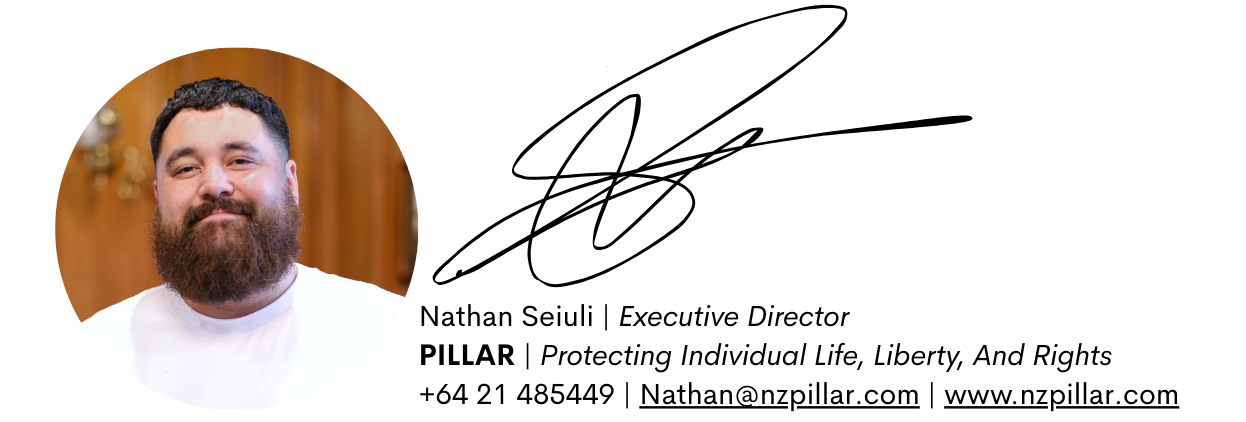The cost of privacy in a digital world.
This week has been filled with talk of digital ID, facial recognition tech, and “secure” databases. Engaging with issues like this sometimes feels surreal. More than once I’ve had to step back from my computer and check I haven’t subconsciously strung red string around the room, connecting photos of Princess Diana to a piece of pocket lint my dog coughed up.
For decades, science fiction warned us about this. Entire genres of film imagined futures where everything was tracked, digitised, and controlled. But in 2025, it’s no longer fiction. In some countries, it’s government policy. Could it soon be ours too?
At PILLAR, we stand for Protecting Individual Life, Liberty, and Rights, and one of our core focuses is the right to privacy. When it comes to this digital push, it’s not about rejecting technology or progress. It’s about making sure Kiwis can participate in key societal functions without sacrificing privacy
On home soil, the government’s new digital driver’s licence is being sold as the first step in a sweeping digital revolution. Judith Collins was quick to promote a “one-stop shop” app where licences are just the start, with more documents and services to be routed through the same system in due course. We’re told it’s about efficiency, cost saving, convenience, and safety.
To some, it’s appealing — I mean, who enjoys losing their licence down the back of the couch or waiting an hour on hold with IRD?
But behind the sales pitch lies a question not being asked loudly enough:
What is the cost of privacy?
New Zealanders are being urged to follow the UK, Australia, and Canada down the digital ID path. But those countries are sliding closer to the models of China and Russia, where liberty is swapped for control. There is no digital utopia at the end of this rainbow.
Why would we copy that?
Data leaks, corrupt officials, surveillance creep, abuse of power — none of this is new. And yet the same politicians now saying “trust us, it’s safe” are still ducking accountability from the last time those promises turned out to be worthless.
I’ve had people say, “You’re too late, all your data’s already online,” or “You’re a hypocrite if you use social media.” But there’s a crucial difference: choice. With social media, you decide what to share. True democratic freedom also depends on voluntary association. If you can’t opt out of a system that centralises your data, then it isn’t freedom at all.
The government insists this shift is “optional,” we know how quickly “optional” loses meaning. If access to student loans, benefits, or even basic services depends on compliance, how much of a choice is it really?
So ask yourself:
Would you trade your privacy for the promise of convenience?
Would you give up freedom of choice for an app that “saves time”?
Would you hand over your autonomy because officials assure you it’s “for your safety”?
Maybe you say yes. Good on you. But in a free society, the answer must remain yours. Because once privacy is gone, it’s never coming back.
These aren’t abstract concerns. They’re daily realities. People depend on secure health records, accurate tax information, and access to benefits. And so our leaders point to overseas systems of centralised data as “models of efficiency” while ignoring their darker side: automatic bank account freezes for unpaid fines, personal data exposed for “naming and shaming,” entire populations monitored and reported on by neighbours.
A fully digitised government doesn’t make life easier, it makes life traceable. And once everything is traceable, it’s controllable. The question isn’t whether it’s possible. The question is whether it’s acceptable.
So what do we do? We say no. We challenge, we question, we speak up. We use our votes, our submissions, and our voices.
Your privacy matters. And we’re committed to protecting it.



